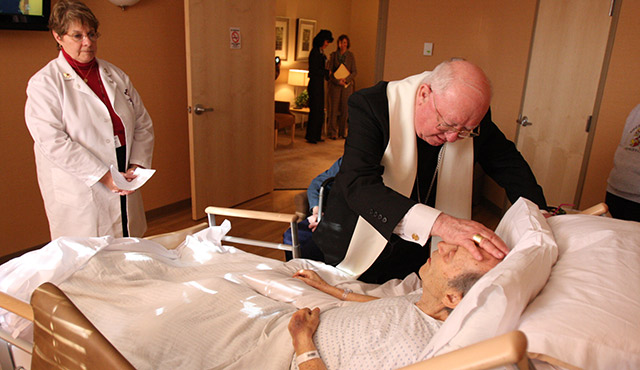Brittany Maynard’s very public choice to end her own life earlier this year under the auspices of Oregon’s right-to-die law is viewed by many as courageous and reasonable given that she was dying of brain cancer. Most of us, however, consider Robin William’s suicide both a tragedy and a waste even though he had been diagnosed with an incurable, progressive disease.
These two cases, which occurred close to one another, dramatically illustrate the impact of suicide on individuals and society, but elicit vastly different reactions. Those reactions are particularly noteworthy as the California legislature considers the End of Life Option Act, SB 128, introduced Jan. 21.
“Robin Williams’ death is a tragedy and a loss to the world,” said psychiatrist Dr. Aaron Kheriaty, an assistant clinical professor at UC Irvine who directs the university’s Psychiatry and Spirituality Forum. “Yet people celebrated Brittany Maynard’s choice. They are not completely different phenomena.”
Kheriaty relies on his Catholic beliefs as well as his psychiatric training to approach patients who are suffering, dying or believe that suicide is their best option. ”Because I believe that people’s lives aren’t worthless accidents but purposeful and meaningful, I help patients understand that, no matter their circumstances, their lives are not hopeless and suicide is not a reasonable action.”
While suicide is sometimes considered by his patients as they suffer terrible pain and their imminent deaths, Dr. Vincent Nguyen shares Kheriaty’s belief that it is never the right option.
Helping those who are in pain and facing death is Nguyen’s calling. A palliative care specialist with board certifications in geriatrics and family medicine, Nguyen considers it a privilege to work with the dying.
“Palliative care isn’t about death or dying, but putting the patient first,” Nguyen said. “It helps people who are seriously ill in the last weeks or months of their lives to help them live and to alleviate their suffering.” With his help, patients have the means to face the remaining portion of their journey and to make peace with their imminent deaths.
“I have the honor of caring for people and walking their journey with them,” Nguyen said. “What brings me happiness as a Catholic physician is to help patients find hope and healing. I’m sad when patients die in front of me, but I know that I’ve helped relieve their pain and assured them that they do not die alone. There is a miracle of healing in the process of dying.”
While a handful of patients have wanted Nguyen to help them die, he has told them he will neither prolong nor speed up the dying process. Most patients fear loss of control rather than death, he said, so he provides compassion while helping them discover ongoing meaning in their lives and deaths.
The Hippocratic Oath prohibits physicians from hastening patients’ deaths, and Catholic beliefs in the sanctity of all life does the same, Nguyen and Kheriaty said.
“Society has communicated to these individuals that they are a burden, but the medical profession and the Church have not,” Kheriaty said. “We say to these people, ‘You are not a burden; in fact, we are privileged to accompany you in this journey.’
“When Mother Teresa dragged someone out of the gutter, even though they were the dregs of Indian society, and gave them warmth and affection while they were dying, that showed us that life is sacred and valuable at all stages and for all people,” he added.
Our intense and irrational fears of suffering are both unhealthy and unrealistic, and our belief that some lives aren’t worth living reflects a eugenics mentality, Kheriaty noted. In the thick of an emotional episode, suicide may appear to make perfect sense, but as Catholics we know that life, however painful, is never hopeless.
The Catholic Church is not alone in opposing California’s proposed legislation. Senior groups, advocates for the elderly, medical experts, suicide prevention professionals and others who are knowledgeable about the law’s complicated and troublesome implications are all part of Californians Against Assisted Suicide.
As a society, both Nguyen and Kheriaty said, we should strive for better options to address the fear and uncertainty of patients like Brittany Maynard, who chose to end her life rather than suffer a certain decline and death from brain cancer.
Any benefits from assisted suicide are simply not worth the real and significant risks of this dangerous public policy, they said. With proper palliative care, the dying have their symptoms treated and are helped through the difficult tasks of completing their lives. The reality is that legalizing assisted suicide is a deadly mix with the troubled U.S. profit-driven health care system in operation today.

